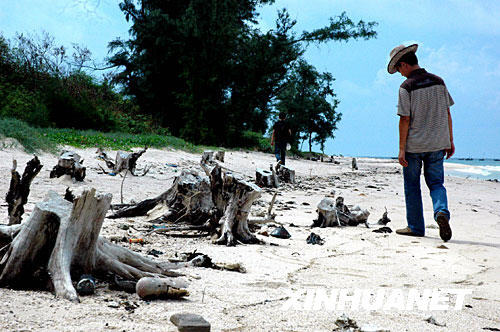Thousands of people living on a south China island fear rising sea levels may soon take their homes and their livelihoods.
The sea is eating into the 25-square-kilometer Weizhou Island, submerging beaches, coastlines and buffer forests.
The 15,000 residents of the island, 20 nautical miles south of Beihai City, Guangxi Zhuang Autonomous Region, have seen the seawater creeping inland for the past decade.
 |
|
A tourist walks past trunks of dead trees of the Casuarina species on a beach of South China's Weizhou Island where rising sea water is submerging beaches, coastlines and buffer forests.
|
"In the bay area were buffer forests, but the seawater has crept 60 to 70 meters into the island," said 76-year-old resident Zhou Ziquan.
Jiang Taile, a restaurant owner, said he once drove his car on the beach up to 40 meters away from the present water line, which is spotted with the stumps of trees that have died in the salt water.
The beach area was full of seawater even at low tide, said Jiang.
Chen Xiangxu, a Weizhou Town construction official, said seawater had made inroads of more than 100 meters at some sites.
The high tides even splashed the windows of homes behind the island's levees, said Chen.
Many residents worried that the island would be eaten away, Chen said, but they were yet to consider moving their homes.